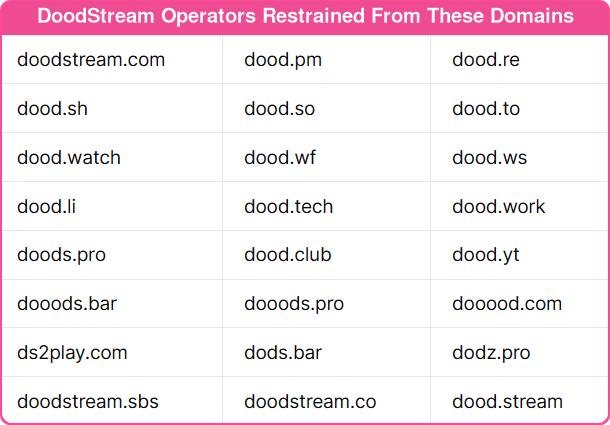 In March 2024, the major Hollywood studios, Netflix, Amazon, and Apple, teamed up in a lawsuit against popular cyberlocker platform DoodStream, previously labeled the leading global piracy threat.
In March 2024, the major Hollywood studios, Netflix, Amazon, and Apple, teamed up in a lawsuit against popular cyberlocker platform DoodStream, previously labeled the leading global piracy threat.
The U.S. entertainment companies had been filing takedown notices to prevent their copyright works being illegally shared among DoodStream’s tens of millions of users, and beyond that, many millions more. They claim the takedown notices were ineffective due to a system at DoodStream that generated replacement links to ensure content remained available.
Since DoodStream is run from India, the site’s owners were sued in the Delhi High Court. In March, an injunction compelled the site to purge itself of all links to the plaintiffs’ content inside 24 hours. As detailed in part one of this article published yesterday, DoodStream didn’t remove the content in the allocated period and certainly didn’t shut down.
Instead, it complained that the links to be removed were supplied in an inconvenient file format, and refused to disable various download links because that would ruin the site. In general, the injunction’s terms appeared to act as a starting point for negotiation, with DoodStream making it clear that it simply wouldn’t comply with certain requests.
The Court’s assessment of DoodStream’s compliance thus far, and its decision based on those findings, could have a profound effect on DoodStream’s ability to conduct business.
Infringing Content on DoodStream “Vast and Numerous”
Compared with documents concerning earlier hearings, the order handed down by Justice Anish Dayal leaves the DoodStream defendants almost nowhere to go.
“[T]he quantity of infringing content that Doodstream allows its users to upload, is vast and numerous. Further, not only does the site, in its current architecture, allow the user/uploader to either simply upload content, create a link and disseminate a link to that content, but also allows users to access infringing content on remote hosts and secure access to the same through the Doodstream website,” Justice Dayal begins.
“Effectively, the site in its current architecture, is an aggregator or a library of unfiltered content, therefore, allowing users/uploaders to inevitably use the platform for disseminating infringing content.”
Not Just Infringing Content, Illegal Content Too
Also “funneled through” DoodStream, the Judge added, is adult pornographic content. The movie companies have no claim in their case related to that type of material, but nevertheless brought it to the attention of the Court. In India, the distribution of pornography is an imprisonable offense.
“Not only is the site allowing the funneling and dissemination of content but also incentivizing the uploaders to place content which can be watched and seen by other users, and get money on a pay-per-view basis,” Justice Dayal continues.
“For this, naturally, the response to the queries of concerned uploaders […] when their link was disabled, was that Doodstream had features on the website that allowed the generation of another link, or avoiding the DMCA radar.”
DMCA Does Not Apply in India
In his now-infamous 2004 letter to DreamWorks, The Pirate Bay’s Anakata politely pointed out that United States law applies in the United States, not in Europe or elsewhere. While arguably still true, it’s hard to run a site from any country without having some kind of contact with the U.S.
However, since U.S. rightsholders are most likely to sue, compliance with the DMCA, for example, is viewed by some as a way to enjoy protection from liability as a passive intermediary might in the U.S. In DoodStream’s case, the gap between perception and reality was huge and as the Judge points out, the DMCA isn’t likely to help here.
“The DMCA compliance, as adverted to by the defendants, may not come to their assistance for the reason that the DMCA is a regulation which is applicable in the United States of America. In India, we are governed by the Information Technology Act, 2000 [‘IT Act’] and the Rules made thereunder. Section 79 of the IT Act gives exemption from liability to intermediary in certain circumstances,” Justice Dayal writes.
Exemption from Liability is Conditional
In common with the U.S. equivalent, exemption from liability in India is not a given. If an intermediary observes the rules and operates with due diligence, that does go a long way to avoiding liability. If, on the other hand, an intermediary has “conspired, abetted, aided, or induced the commission” of an unlawful act or, as the Judge puts it, fails to expeditiously remove or disable access to infringing material, for the intermediary “that is vitiating.”
The Judge notes that intermediaries must observe the Information Technology (Intermediary Guidelines and Digital Media Ethics Code) Rules, 2021, which expressly forbid the storage and distribution of content for which no rights have been obtained, or is pornographic in nature.
For an intermediary to successfully limit liability via a defense of due diligence, under the rules it must have previously appointed an officer to oversee a ‘grievance redressal mechanism’. Since it appears that DoodStream has no mechanism and no officer, Section 79(2)(c) of the IT Act will not come to its rescue, the Judge suggests.
“Moreover, the insulation, if any, is prone to be punctured due to their acts of inducement or abetment for users/uploaders to use Doodstream for uploading and disseminating infringing content.”
Too Much Infringing Content to Remove Quickly Is Not a Defense
As mentioned in yesterday’s article, DoodStream submitted that it wasn’t given enough time to remove infringing links, since the volume was just too great. Justice Dayal found the excuse uncompelling.
“The defendants cannot have an excuse that a large amount of infringing content links made it practically impossible for them to fully comply with the orders of this Court,” the Judge notes.
Recalling a similar case against Mixdrop, a broadly similar file-hosting service from which around 600,000 to 800,000 links were removed, the Judge quickly drew parallels to the case in hand. Here, 500,000 to 1,000,000 links represent infringement of the plaintiffs’ rights on a similarly large scale.
With the Mixdrop matter for guidance, the Judge formulated his decision here along similar lines.
DoodStream’s Operators Banned
Having determined similarities between the DoodStream and MixDrop cases, Justice Dayal’s decision targets DoodStream owners Raja Durai and Sarvesh Chandran by restraining their ability to do business.
In view of the above facts and circumstances, and considering that this Court is conscious and alert to the issue of piracy through rogue websites of infringing content, till the next date of hearing, directions are being passed in the following terms:
a) Defendants nos. 5 and 6, and all those acting for/on their behalf, are restrained from directly or indirectly operating the website Doodstream.com, and domains which are listed as defendants nos. 1, 2, and 3 in the memo of parties..[..]
Defendant no.5 and 6 and all those acting for/on their behalf are also restrained from using any other similar platform to make accessible content which is infringing of the plaintiffs’ proprietary rights and uploading, posting, screening, distributing, or making available to the public through/in any manner whatsoever, the cinematographic work/ content/ programme/ shows in relation to which the plaintiffs have copyright.
In the event the content, rights, or access to the same from the Doodstream portfolio of websites is transferred to any third party and/or subsequently operated through a mirror/ redirected/alphanumerically varying website(s), the plaintiffs shall have a right to approach this Court for suitable directions along with documents to substantiate its claim.
The next hearing is listed for September 18, 2024, but if DoodStream can show compliance in the interim, they can apply to modify Justice Dayal’s order. That’s unlikely to prove straightforward.
Catch 22
To show full compliance, the DoodStream platform will need to be modified to prevent reappearances of the plaintiffs’ content. Unfortunately, as per the text above, the site’s operators “and all those acting for/on their behalf, are restrained from directly or indirectly operating the website.”
At the time of writing, DoodStream remains online either intentionally, or possibly because the injunction prevents the operators or anyone else shutting it down.
That raises the question of what happens when movies and TV shows are illegally uploaded but nobody has permission to take them down. The reign of the autonomous website may have arrived early.
All public filings in the case thus far are available here (pdf)
- SEO Powered Content & PR Distribution. Get Amplified Today.
- PlatoData.Network Vertical Generative Ai. Empower Yourself. Access Here.
- PlatoAiStream. Web3 Intelligence. Knowledge Amplified. Access Here.
- PlatoESG. Carbon, CleanTech, Energy, Environment, Solar, Waste Management. Access Here.
- PlatoHealth. Biotech and Clinical Trials Intelligence. Access Here.
- Source: https://torrentfreak.com/court-bans-doodstreams-owners-associates-from-running-the-site-240608/




